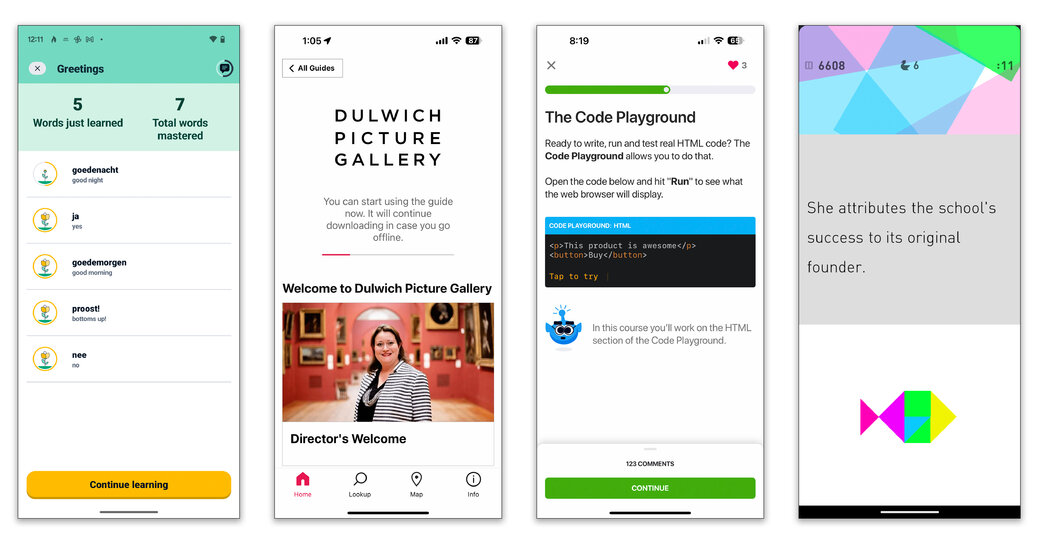Autumn is edging closer, and the return to a more regular office schedule looms for many people — and with it, the waiting time for transportation, meetings and appointments. Games, reading, social-media scrolls or just zoning out are common ways to spend these spells, but if you want more mental stimulation, why not boost your brain with brief lessons in subjects that interest you? Here’s a guide to finding Android and iOS apps that turn your smartphone into a traveling pocket tutor.
Learn a Language
Web-based academic courses and music lessons have boomed in the past few years, especially as remote learning became a part of pandemic life. Although Apple and Google have their own free translation apps, some people also found online language lessons useful. No one wants to hear you practice your French pronunciation on a commuter train, but several language-instruction apps offer free or inexpensive tutorials in vocabulary and grammar that you can do quietly or while wearing headphones.
Babbel, Duolingo, Memrise and Rosetta Stone are among those that offer short lessons for a wide choice of languages. Each app requires a user account that you must set up for lessons to track your progress. Duolingo and Memrise both have free plans along with paid options, and tend to make learning more gamelike with videos and touch-screen exercises; note that Duolingo recently suffered a breach of user data. Babbel and Rosetta Stone are more focused on conversational skills and ask you to subscribe to continue your studies; prices vary, but expect to pay less than $100 a year for full access.
Explore Global Culture
If you’d like to pretend you’re not trapped in a bus seat for 45 minutes each way, you can visit the great museums of the world virtually through apps like Bloomberg Connects and the Google Arts & Culture app for Android and iOS. Both apps are free.
Bloomberg Connects has more than 200 guides so far, with videos and collection highlights from art museums around the world and other cultural sites. These portable museum tours mix video with text and images, and can be downloaded for times when you are without internet access.
Google Arts & Culture has content from more than 3,000 cultural institutions, landmarks and sites from across the globe. Travel guides to the world’s major cities, as well as science and history exhibits and culture-based games, are also included.
Even though TED Talks have become something of a pop-cultural aside (“Thank you for listening to my TED Talk”), thousands of free lectures on technology, science, design and cultural topics are available free in the official TED app for Android and iOS. The talks can be downloaded for offline viewing when you sign up for a free user account.
Study Science
You can also learn the basics of computer coding on your mobile device. Although Google recently discontinued its free Grasshopper app for teaching the basics, you can find plenty of tutorials and guides for learning coding fundamentals on your phone.
The basic plan offered by Sololearn has free, short coding lessons in several computer languages; the pro plan includes interactive demos and other features for $70, billed annually.
If you are already doing free web-based lessons on the Codeacademy site, the company’s Codeacademy Go app offers flash cards and practice tools for mobile learning. And if you are toting an iPad around, Apple has its free Swift Playgrounds app, which teaches Swift-language coding through interactive puzzles and exercises.
The nonprofit Khan Academy has a selection of adult learner courses in computer programming, animation and other topics. The company has mobile apps and YouTube videos, but some content is viewed in a mobile browser.
NASA has a full-featured multimedia app that showcases its space missions, and the agency has produced several other free educational mobile apps and games devoted to aeronautics, the solar system and more. Links to the software can be found with an app-store search or on the NASA website.
Get a Mental Workout
If you want to take a break from learning to show off how much you already know, there is no shortage of mobile trivia apps in the app store, including Knowledge Trainer, which tests you with 6,000 questions in a range of subjects. The ad-free premium version costs $6 a year.
For further mental stimulation, “brain training” apps like Elevate or Peak that purport to build cognitive skills through games and stimulating exercises provide another place to focus your attention. A free level is available, and an annual subscription to either app is less than $40.
Some days may be better than others for micro-learning, but on those days when there’s a transit or meeting delay, you can at least get in a little extra study time.
J.D. Biersdorfer has been writing about consumer technology for The Times since 1998. She also creates the weekly interactive literary quiz for the Book Review and occasionally contributes reviews. More about J. D. Biersdorfer
Source: Read Full Article
